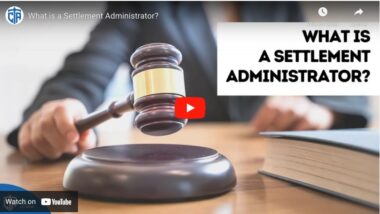Top Class Actions’s website and social media posts use affiliate links. If you make a purchase using such links, we may receive a commission, but it will not result in any additional charges to you. Please review our Affiliate Link Disclosure for more information.
A class action lawsuit is a way for consumers to hold businesses and other entities responsible for product defects, fraud, negligence, or other actions that harm individuals. In a class action lawsuit, an individual or a small number of plaintiffs file a lawsuit on behalf of a larger group.
Most commonly, class action lawsuits enter into a settlement agreement, rather than going to trial. While settlement agreements often seem quite large, in the millions of dollars in some cases, money divided in a class action lawsuit can be another matter. However, experts recommend Class Members still file claims, even if the dollar amount of the settlement award is low.
The Class Action Lawsuit Process
Class action lawsuits begin much like other legal actions, with a complaint filed by the plaintiff against other parties they alleged caused injury. Also, much like other lawsuits, the parties must respond to each other’s court filings and submit evidence supporting their positions.
Class action lawsuits may also be organized into multidistrict litigation should a number of similar actions be filed.
An additional step in the class action lawsuit process is that the plaintiff must prove that the class of people they wish to represent is accurate and that the plaintiff is an appropriate representative, called class certification.
Settlements are common in class action lawsuits if the court grants class certification. It is rare for a class action lawsuit to go to trial. However, a proposed class action settlement will still need to go back to the court for approval.
As noted above, class action lawsuits are organized on behalf of a large group of people who have allegedly been harmed by the actions of a company or other entity. Class actions are a valuable tool to protect consumers because they allow companies to be held accountable for minor injuries to great numbers of people.
On the flip side, however, money divided in a class action lawsuit may need to go to thousands or even millions of consumers, also known as Class Members. Multimillion-dollar payouts by companies in a class action settlement may need to be divided between millions of Class Members, making the individual award quite a bit smaller.
As a part of the settlement agreement, Class Members will be notified. Often this occurs through mailings, ads in magazines, or online ads. Class action websites, such as Top Class Actions, keep a list of active settlement awards as well.
Depending on the type of settlement agreement, Class Members may need to send in a claim form and supporting documentation to make a claim. Others may not, and will be automatically entered into the settlement.
In addition, Class Members can decide whether to object to the settlement or exclude themselves. Objecting to a settlement agreement means that the Class Member thinks it is unfair in some way. Class Members who exclude themselves are not able to participate in any of the benefits of the settlement, but preserve their right to make a separate claim.
 Types of Class Action Settlements
Types of Class Action Settlements
Headlines can make it seem like class action settlements are reaping huge windfalls for Class Members. However, money divided in a class action lawsuit needs to go to a number of individuals, including the lead plaintiff and their attorneys. In addition, the settlement agreement may be crafted in such a way that funds end up in other places, like charities.
There are several ways class action settlements can be set up:
- Claims Made
- Common Fund
- Pro Rata
- Vouchers or Coupons
Class action lawsuits over allegations that a retailer treated customers unfairly or committed fraud often enter into “claims made” settlements. In these cases, it may be impossible for the parties to the class action lawsuit to identify Class Members. As such, the defendant pays an amount equal to the total value of all of the valid claims. This means that Class Members must submit a valid claim to take part in the settlement agreement. The plaintiffs’ awards and attorneys’ fees are handled separately in a claims made class action settlement. Any unclaimed funds in a claims made settlement usually goes to a charity, known as a cy pres recipient.
Other types of class action lawsuits involving employment claims or antitrust activity often enter into a common fund class action settlement. In this type of agreement, settlement funds are entered into a common fund that is divided among Class Members depending on some type of formula determined by the parties. In these types of lawsuits, the identity of the Class Members, along with other details, are likely known to the defendants. Money that goes unclaimed in these settlements is often given to a cy pres recipient.
Pro rata settlements divide money in a class action lawsuit by splitting the amount equally among the Class Members. The share each Class Member will receive can depend on either the total number of individuals in the Class or by the number of valid claims filed, depending on how the agreement is drafted. In pro rata settlements, the class action settlement payout can become smaller than expected if a high number of claims are submitted.
Some class action settlements may result in a coupon or voucher being offered to Class Members. These types of settlements are becoming less common after the passage of the Class Action Fairness Act in 2005. Voucher class action settlements that require Class Members to make additional purchases or purchase more goods from the defendant run the risk of being disapproved by the court. In certain circumstances, vouchers, especially those that do not expire and are not restricted, may be included in a class action settlement.
Plaintiffs’ Awards
Money divided in a class action lawsuit settlement usually contains a provision for an award for the plaintiff. These awards are generally modest, several thousand dollars or so and are meant to compensate the lead plaintiffs in a case.
Attorneys’ Fees
When parties to a class action lawsuit enter into a settlement, there is usually a provision for the plaintiff’s attorney’s fees. The defendants usually pay their lawyers separately, but the attorneys for the plaintiff are paid out of the settlement fund.
Attorney’s fees in class action settlements can be structured differently, but must be approved, along with the rest of the settlement, by the court. Though some have criticized the practice as leading to frivolous lawsuits filed by lawyers looking for a quick payout, attorney fees based on settlement agreements also allow individual consumers to hire better attorneys than they otherwise would be able to afford.
Unclaimed Class Action Settlement Money
There are a number of reasons why there may be unclaimed funds after money is divided in a class action lawsuit. In some cases, the number of valid claims filed could be less than expected. Alternatively, the claims that were filed could have been for a lower dollar amount and the settlement fund was not exhausted.
In either scenario, the unclaimed settlement funds will not likely revert back to the defendant, though, in some rare cases they do. Unclaimed funds will be distributed depending on how the settlement agreement was structured.
Some settlement agreements require the unclaimed funds to be distributed among existing Class Members, who sometimes see a second award. Others provide for distribution to a charity or non-profit, called a cy pres recipient.

 Types of Class Action Settlements
Types of Class Action Settlements













14 thoughts onHow Is Money Divided in a Class Action Lawsuit?
What can we do about CashApp and These Double Charges ?
Just curious if anybody paying attention knows the breakdown for the nec baby formula class action lawsuits would go . Like punitive damages what are all the damages explained and how to determine that yh our not being ripped off if the class action is huge?
Are you kidding? Everyone has family issues. It appears you’re here to vent your feelings. I’m positive there is a web site for that somewhere, but this one is for class action lawsuits. Real ones.
My mother received a letter from JND/legal representatives for the
Rhea vs Apache Corporation
I sent an email to the administrator of the Apache Corp
That stated my mother died 8 yrs ago and i am one of four children
My inquiry was if my mother had a placement in this lawsuit
Of which a reply came thanking me for advising them
They wrote again and asked fir a few details……(i did not see this reply for almost 4 months)
(Please dont ask) upon discovering email from apache coro i responded in turn and was in turn given the reply that uf i had trouble depositing the check to let them know and my question is what name does this xheck come in?my moms? Mine?dont kniw how a company coyld write a check on someones name whis been passed aay for 8 years??
Need a lawyer for class action lawsuit
Yes I need a different lawyer
I need an attorney to start a case I don’t know where to start
Hi! Is the total award of a class action proportional to the number of plaintiffs? In other words, once a classaction process has started, if more and more people sing up to be part of this classaction as plaintiff, could the total award of a classaction in the end be increased as well?
If part of Santa class action can I receive more than most because of my severe cancer or will I just receive the same
Hamilton Beach microwave smokes from the metal piece inside of it. The product has 1yr warranty. Walmart 8553131612 is printed on the back of the microwave. They say to return to store. Walmart store refuses to take product over 90days. Hamilton Beach won’t accept product either. I have filed complaints with Walmart corporate and Hamilton Beach. So I’m waiting. I bought microwave 10.2.21. Hamilton Beach class action sounds great.Ive read many people have experienced this issue.
If you received an award letter for a specific amount that you will be given, do you get that amount or are there fees taken out of the stated amount as well? It’s for a class action settlement.
I received a information card in regards to my pen ?, who do I talk to about this issue?